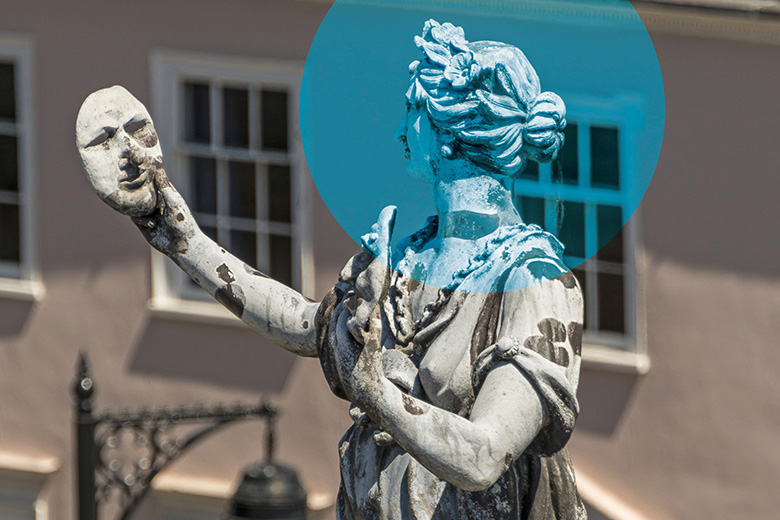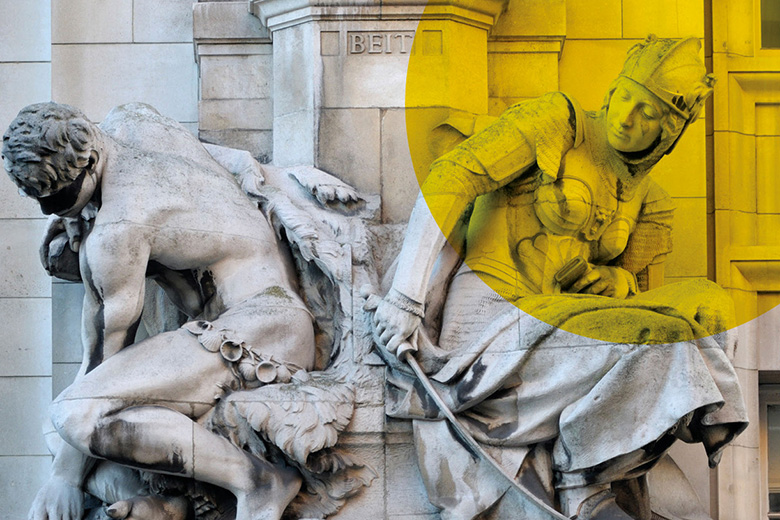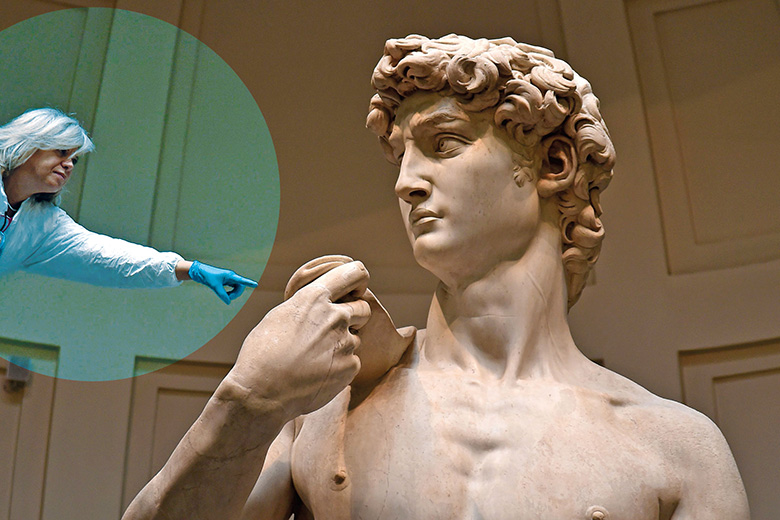In August, a report by Rand Europe confirmed what many had long suspected: that academics face a greater mental health risk than the population at large. About two in five scholars have common mental health disorders, such as depression or stress-related problems. Among the reasons behind this, the report, which was commissioned by the Royal Society and the Wellcome Trust, identified environmental risk factors such as heavy workloads and lack of job security and management support. But is there anything that academics themselves could do to boost their well-being? Here, scholars from disciplines ranging from philosophy to neuroscience share their insights into how the search for happiness should be conducted – if it should be conducted at all.

Psychology
You can change either the way you think about yourself or how you think about your circumstances
It is no secret that many academics struggle with well-being. From Socrates to Freud, Newton to Nash, brilliant scholarly minds have often tackled formidable intellectual challenges only to realise that their greatest obstacle was the darkness of their own psyches. The double whammy is that unhappy academics are also missing out on the proven benefits of improved health, higher income and happier social lives that stem from having a brighter outlook.
Over the past two decades, our laboratory has investigated what makes people happy and what habits happier people share. This has allowed us to identify simple strategies to boost happiness in daily life. In some cases, the most effective approach is to change the circumstances causing unhappiness, such as binning that lousy partner who makes you feel miserable about your love life. In other cases, it is more effective to target your mindset. In other words, you can change either the way you think about yourself or how you think about your circumstances.
Regarding the former, targeting particular personality traits and habits is one possible path. Most simply, you can exercise more; frequency of physical activity is associated with improvement in life satisfaction. Counselling can also help; targeting traits of anxiety or depression might be useful, especially when problems seem too great to tackle alone.
Changing the way you think about your circumstances is also achievable. Many academics see their jobs as callings rather than as merely a means to pay the bills; people who think this way report higher job satisfaction. Moreover, many academics are, objectively, doing just fine; professionally and intellectually, they are succeeding at a high level.
But it doesn’t always feel that way. One reason is that academics (like most other people) are prone to comparing themselves with colleagues and subject peers. Comparison – whether it is h‑indexes or promotion trajectories – has been shown to be toxic to happiness. It isn’t that glum people compare themselves with those doing better while happy people compare themselves with those doing worse: happy people simply don’t compare themselves with others at all – and happy academics are probably spending all that extra psychological energy applying for grants.
Dealing effectively with failure is also crucial for academic happiness given the continual knock-backs that even the most successful experience. For this, practising “self-compassion” is important: treat yourself with kindness and recognise that negative emotions and failures are part of the common human experience. In addition, try to adopt the “growth mindset” theory popularised by Stanford psychologist Carol Dweck. In contrast to those with a fixed mindset, people with a growth mindset believe that their traits – such as their intelligence level – can be improved through practice. In that sense, failure is an opportunity to learn from mistakes, so it is nothing to be ashamed of.
Meditation can also help. Near-countless studies have found that it decreases negative feelings and increases mindfulness. Although daily meditation can be practically challenging, it might be one of the most empirically supported strategies for long-term changes in emotional processing.
When addressing the less savoury aspects of your life, changing your actual circumstances – not just your perception of them – is also important. Perceived social support and number of social ties are both robust predictors of health, longevity and happiness. Loneliness can increase the risk of depression, as well as inflammation and susceptibility to disease. The academic life often lends itself to long hours alone in scholarship, but you should prioritise important relationships; after all, a longer life means more time to publish.
Academics might also want to consider easing up in the promotion rat race. We humans have a remarkable capacity to get used to any positive changes. So when you attain something really good – a well-matched partner, an engaging colleague, a grant renewal – you feel an immediate boost in contentment. Unfortunately, however, a phenomenon called hedonic adaptation means that it is usually short-lived. Thus, the cliché is true: unless you are very poor, live in a war zone or have an abusive spouse, in the words of the poet William Cowper, “happiness depends, as Nature shows, less on exterior things than most suppose”.
Above all, don’t forget to overlook what is going right for you. Counting your blessings or writing gratitude letters might seem hokey, but a flood of research has found that such activities make people feel happier, more connected, more inspired and even more humble. Savouring, which can be as simple as pretending that this month is your last living in your city, can make a difference: people who naturally savour tend to report higher life satisfaction, value fulfilment and intensity and frequency of happiness. And emailing your thanks to a doctoral adviser who saw your potential when you were at your lowest, or to a former student who led you to an exciting research question when you felt stuck, will make you realise just how fortunate you are.
Julia Revord is a doctoral student at the University of California, Riverside’s Positive Activities and Well-Being Laboratory. Its director, Sonja Lyubomirsky, is professor of psychology.

Neuroscience
Self-interested desires seldom last and, instead, meaningful pleasures more often arise from helping others
In early spring of 1940, the American novelist John Steinbeck travelled to the Sea of Cortez (Gulf of California) with his close friend Ed Ricketts, a marine biologist. During their six-week specimen-collecting expedition, they continued their deep conversations on philosophy, ecology and science, grappling with the many contradictions found within the storytelling animal struggling to find a place within the natural world.
Their resulting joint book, Sea of Cortez: A leisurely journal of travel and research, is a most unusual mix of narrative and biological records, which was reflected in its sales (they languished). But it contains deep insights that resonate with contemporary brain research. In one of the most interesting sections, they write: “Man might be described fairly adequately, if simply, as a two-legged paradox. He has never become accustomed to the tragic miracle of consciousness. Perhaps, as has been suggested, his species is not set, has not jelled, but is still in a state of becoming, bound by his physical memories to a past of struggle and survival, limited in his futures by the uneasiness of thought and consciousness.”
It is true that we are limited by consciousness and, especially, by our unmatched ability and desire to predict an uncertain future based on a difficult past. While this helps us to survive, it can also stop us from truly enjoying the present.
We spend much of our time trying to predict what to do to obtain the rewards, such as food and sex, that allow us to survive – and we subsequently tell ourselves and others stories of these endlessly fascinating exploits. Research has started to provide some insights into the art of prediction. The 2017 Brain Prize was given to research by Wolfgang Schultz, Peter Dayan and Ray Dolan, who have demonstrated that the mammalian brain contains specific mechanisms for learning to predict how to obtain rewards. These findings are closely linked to more general research into the underlying fundamental mechanisms for pleasure and well-being. Over the short term, reward learning can be thought of as a recurring chain of events. Its initial phase involves wanting a reward, becoming motivated to seek it out and predicting how best to quell the desire for it. Once the reward has been obtained, there follows a liking phase, resulting in momentary pleasure, until satiation sets in. Then the cycle repeats – although usually for a different reward.
During this cycle, the brain is trying to balance the available resources by optimising the trajectories of dedicated neural networks. Groundbreaking research in rodents by neuroscientist Kent Berridge from the University of Michigan has identified the brain regions, networks and neurotransmitters that facilitate the underlying choreography of the pleasure cycle. Imbalances in this cycle are at the root of mental health problems, and are usually described as “anhedonia”: the lack of pleasure. Take, for example, addiction, which is strongly associated with problems transitioning away from the wanting phase. Addicts describe how the strong desire for their drug of choice persists even as the pleasure obtained wanes over time. Or as the French polymath Blaise Pascal described it: “Description of man: dependence, desire for independence, need.”
Over the past 20 years, I have used brain scanning with ever greater precision to measure the activity elicited by the pleasure of many different rewards, such as food, sex, drugs and music, in both healthy and unwell volunteers. We have even started building whole-brain computational models that can describe normal and disordered human brain activity. These are providing us with unprecedented insights into the pleasure cycle, which may in turn lead to new treatments for disorders such as addiction or depression.
But, as Aristotle pointed out, there is a major difference between “hedonia” (pleasure) and “eudaimonia”: a life well lived, embedded in meaningful values and generating a sense of engagement. Pleasure is but a brief moment during a state of well-being – and while we can reliably elicit hedonia with, for example, food, it is much harder to elicit and measure eudaimonia.
Moreover, happiness tends to evaporate when we try to introspect, and we are not very good at it. This is why self-report studies of happiness are difficult to interpret and why the progress in understanding eudaimonia has been painfully slow. Still, research is starting to uncover the underlying brain networks. In particular, the study of meaningful pleasures is yielding important results. This is especially true when combined with whole-brain computational models that allow you to establish causal relations that can be used to rebalance the actual brain.
Getting into the groove of funk music or enjoying the appeal of infant cuteness are social activities that are highly likely to bring meaningful and long-lasting pleasure. In addition, the resurgence of brain research into the efficacy of psychedelics such as magic mushrooms in treating addiction and depression might permit the triangulation of all the studies to reach a deeper understanding of the brain ingredients of a meaningful life.
Meanwhile, the present evidence suggests that the social pleasures, in particular, are vital for counteracting anhedonia. Our constant balancing act of matching exploration and exploitation in the pursuit of rewards requires variation rather than repetition. This is especially pertinent for academics, who are often stuck in the office on their own, performing repetitive tasks.
Self-interested desires seldom last and, instead, meaningful pleasures more often arise from helping others. Sharing coffee and laughter can instantly make us feel better. And we can only gain from practising empathy and compassion in our relationships with students and colleagues. It might help, for instance, to be less critical in reviewing and to take pride when colleagues do well, rather than to succumb to the old joke about how to make an academic miserable.
This can bring about the ability to enjoy long moments of bliss – in spite of the tragic miracle of consciousness. Over time, empathy and shared joy might even bring about catharsis: the deeply meaningful release or cleansing of emotion essential to both science and art.
Morten Kringelbach is associate professor and senior research fellow in the department of psychiatry at the University of Oxford and professor of neuroscience at Aarhus University, Denmark. His latest book is Emotion: Pleasure and Pain in the Brain (2014) (with Helen Phillips).

Economics
If money buys only a small amount of happiness, think carefully before becoming a dean for the cash
Only feelings matter. I am sorry if you intrinsically care about stars or microbes or coal production or barely alive wiggly creatures at 20,000 leagues deep. But if we think things through, the only good reason to focus on such topics is that one day they might shape the well-being of humans or other animals.
Hence it is happiness that scientific investigators should focus on. Even some university economics courses are starting to recognise that. The economics of happiness started principally because of Richard Easterlin. A lanky, erudite iconoclast, now at the University of Southern California, he studied engineering in the 1950s, went on to do an economics PhD and became one of the world’s most famous demographers and economists.
In the early 1970s, Easterlin noticed that there were regular statistical surveys of how Americans felt about their lives. He wondered if they might tell economists something helpful. So he looked, and they did. But he could not get his work published in peer-reviewed journals.
The thing about important but inconvenient ideas is that they have a way of resurfacing, like an air-filled pirate treasure chest, even when it is annoying for those who prefer them sunk. Eventually published in an edited volume in 1974 as “Does economic growth improve the human lot? Some empirical evidence”, it famously concluded that it does not. Decade after decade, happiness levels did not budge, despite Americans getting much of the tea in China and enough motor cars to consume a ninth of the petroleum produced annually in the world.
Economics courses still teach that a nation’s happiness flows from having more money. But modern academic economists are a little more favourable to the idea of an economics of happiness, and some accept Easterlin’s Paradox. They have come to think that it is caused by people comparing themselves with others: the idea that it is hard for you to become happier by being richer if all the other academics on your departmental corridor are getting better off at the same rate, leaving your relative income unchanged. Many of us have newer research showing that happiness depends on relative pay and your rank in the monkey pack of human life. One day, world leaders will talk in their speeches about this. But not yet: it remains conceptually scary.
For non-specialists, three new themes in current research seem worth knowing. First, the economics of happiness has developed statistical ways to measure the impact of many subtle factors on your well-being. Think of the quality of the air, say. We now have studies that measure daily movements in air particulates and then link those numbers to data on happiness survey answers in particular regions on particular days. It is thus possible to calculate the unhappiness resulting from poor air quality, and to express that unhappiness value in monetary terms. Second, we can put a value on happy relationships. A good marriage or near-marriage, for example, is worth about £70,000 a year in happiness. Third, we are getting increasing evidence that there really is a kind of midlife crisis in human happiness, before it rises again in older age.
For academics, there are lessons from this. If money buys only a small amount of happiness, think carefully before becoming a dean for the cash. Next, bear in mind that the more that everyone’s academic salaries become public, the lower will be general morale in your department. And third, if you are currently middle-aged and you find economists a wee bit depressing, then wait a bit. One day, we won’t seem so bad.
Andrew Oswald is professor of economics and behavioural science at the University of Warwick.

Sociology
The path to happiness is sometimes an indirect one…Doing the right thing can contribute to personal happiness
Are you happy being an academic? Some people find that question hard to answer. I don’t. I love my life as a teacher and researcher. And while my own happiness is not the only important question about my career, it does matter, to me – and why shouldn’t it?
But happiness is a controversial notion, especially among sociologists. Some people think of happiness expectations as oppressive, or at least as neoliberal “responsibilisation” (the transfer of responsibility for resolving problems from institutions to individuals). And much of the research is based on quantitative analysis; one might indeed be troubled by seeing happiness reduced to a single response on a survey questionnaire (although I do it in my own research exploring whether migration results in greater happiness for migrants).
More to the point: it probably seems intuitively obvious that if we want to improve happiness, what’s needed is to deal with poor and deteriorating work conditions. Autonomy reinforces happiness, especially at work; powerlessness undermines it. So reviving professional autonomy in research and in the classroom is surely a necessity for any institution that claims to care about its employees’ well-being. Ending salary erosion might help, too.
The problem is, there’s virtually no chance of reshaping Western universities in ways that would genuinely support employees’ happiness. Institutional leaders all pay lip service to it, but the narrow limits are all too apparent. No one is going to restore faculty governance to make academics happier.
The things that universities do in the name of staff well-being are, by contrast, sometimes downright cringe-worthy. One institution (I’ll name it privately if you write to ask) recently held an event featuring smoothie-making, yoga stretching, herbal-tea drinking and personal development reading. It’s beyond parody, and it gives well-being a bad name, especially among critically minded people.
So do happiness studies have anything to offer? Yes – but you might not like it. For people who already enjoy relatively favourable circumstances (and let’s face it, that includes most of us), one way to reinforce happiness is to moderate your expectations. For instance, aspiring to change one’s circumstances can end in disappointment even when the aspiration is achieved. That’s one way to make sense of the idea that “money doesn’t buy happiness”. If you really want more money, you’re probably making invidious comparisons with others who earn more than you do – and you’ll likely continue doing this even if you get a pay rise. That way of thinking (and its consequences) surely extends beyond money.
Now, findings of that sort are exactly what lead some people to perceive happiness studies as having limited value. It sounds like a road to resignation and fatalism. It takes pressure off those who wield power, suggesting that the path to happiness is in no small measure a private one. There’s some affinity here with venerable religious perspectives (especially Buddhism), but that is likely to be small consolation to mostly secular academics.
I genuinely don’t mean to preach a doctrine of resignation. Even on grounds of happiness, we should continue to fight for the restoration of faculty governance and respect for professional judgement. (What else are they paying us for?) And there are other reasons to work for social change, at work and elsewhere: happiness is not the only form of the “good life”.
However, private seething doesn’t strike me as a necessary or beneficial component of a social change agenda. Public seething is useful, perhaps – but best to deploy it as a strategy, a performance, rather than letting it become who you are.
A final thought: the path to happiness is sometimes an indirect one; the single-minded pursuit of it can be self-defeating. Some authors, such as Svend Brinkmann in his recent polemic, Stand Firm: Resisting the Self-Improvement Craze, urge us to ignore our own happiness and do the right thing. But these options might be more complementary than contradictory. Doing the right thing can contribute to personal happiness.
So be generous with your students, even if you think they’re uninterested and callow. You can’t know your eventual impact on them, and you can likely get satisfaction for yourself by offering them more than you think they deserve.
David Bartram is an associate professor in sociology at the University of Leicester and co-editor of the Journal of Happiness Studies.

Philosophy
Sharper distinctions, critiques of poor reasoning and challenges to common-sense ideas bring us closer to an understanding of happiness, even if they don’t tell us how to live
My philosophising springs from Socrates’ poignant statement in Plato’s Republic: “The question we are talking about is not a trivial one: we are asking how we should live.” Philosophers have never reached a reliable consensus on this, so critics may ask why they should pay attention to philosophical discussions of what sort of life will make us happy. The answer is that philosophy offers clarifying distinctions, critiques of poor reasoning and stimulating challenges to our common-sense ideas about happiness. All this brings us closer to an understanding of happiness, even if it doesn’t authoritatively tell us how to live.
Recently, however, empirical psychologists have claimed that they can authoritatively answer the Platonic question on the basis of their new “science of happiness”. For example, in their 2008 book Happiness: Unlocking the Mysteries of Psychological Wealth, Ed Diener and Robert Biswas-Diener announced their “ambitious goal of describing how you…should live your life”. They don’t claim to have all the answers yet, but they predict that in the coming century the science of happiness will “revolutionise our understanding” of the concept.
Other distinguished psychologists, such as Martin Seligman and Dan Gilbert, make similar claims, and there is now a spate of self-help books purporting to replace the standard anecdotal and inspirational approaches with advice based on rigorous scientific research.
I have my doubts. Apart from the well-publicised problems with reproducibility in psychological research, happiness research relies heavily on people’s self-reports. The researcher asks a few simple questions, such as “How close is your life to your ideal?”; “To what extent are you satisfied with your life?”; “If you could live your life over, how much would you change?” – all answered on a numerical scale. A typical study correlates the answers with other characteristics of the subjects, concluding, for example, that married people are happier than the unmarried or that, beyond an income of $75,000 (£56,600), more money has little effect on happiness.
This is a plausible common-sense method: if I worry that my friend might be depressed, why not just ask? But can people really be trusted to tell the truth about such a personal matter? And do they have a good sense of how happy they are, or even of what would make them happy? Would a different set of questions result in different answers?
In response, psychologists attempt to show that their method gives similar results when they employ other common-sense ways of measuring happiness. They find, for example, good correlations with the judgements of subjects’ family and friends, with assessments from extended interviews with subjects, and with observations of subjects’ facial expressions, posture, movement and so on.
But it’s problematic to base a scientific method on common-sense beliefs. One of the goals of a scientific study should be to test the validity of widely held beliefs. Happiness studies do sometimes claim to refute such beliefs, such as about the importance of money or the positive effects of having children. But the conclusions about what will promote or impede happiness still assume common-sense views of what happiness actually consists in – conceptions that are, in fact, very likely a major source of our unhappiness.
This is where philosophers’ discussions of happiness become relevant. Among the ancients, for example, Plato and Aristotle judged intellectual understanding and moral virtue as essential to a happy life, and the Stoics found happiness in limiting rather than satisfying our desires. Other philosophers have found happiness in states commonly viewed as negative, such as ascetic renunciation (Schopenhauer), suffering (Nietzsche) and the anguish of free choice (Sartre).
Such theories are not spun out of pure intellectual air. They derive from the rich life experiences of individuals often exceptionally attuned to the subtleties and complexities of human existence – and to the criticisms of rival conceptions. Such experiences provide a deeper understanding of happiness – and, as Plato and Aristotle saw, this understanding itself contributes to a happy life. A similar point holds for all humanistic studies.
I’m not saying that empirical science can make no contribution to our search for happiness. But while it might some day supplement what the humanistic disciplines have been revealing about happiness for the past 2,500 years, it will never replace it.
Gary Gutting holds a John A. O’Brien chair in philosophy (emeritus) at the University of Notre Dame.

Neuroscience
Investing your all in your work, hoping that it will make you happy, is dangerous
Happiness is the experience of subjective well-being, according to an influential psychological analysis. Subjective well-being comprises feeling positive emotions, being engaged with the world, having positive and extensive relationships, experiencing meaning and having a sense of accomplishment.
Achieving all these within a working life, or life at large, is a tall order. Unfortunately, humans are poor at predicting what will make us happy, and adjust rapidly to rewards. Even lottery winners typically revert to pre-win levels of happiness within two years.
Among academics, there is the pervasive frustration with tedious administrative processes; boredom from interminable meetings; deferred gratification because of the lengthy periods it can take to publish research; and a sense of anticlimax when your work eventually appears. Getting a grant feels like winning the lottery, but then you have the anxiety of running and delivering on the project it funds. There are other emotions, too, such as the loneliness of slogging away on something obscure and unfashionable.
The everyday drivers of academic work are often inimical to happiness, but may paradoxically offer a route to meaning and satisfaction. To prosper requires high levels of intrinsic motivation, such that you find your reward in the work you do. Negative emotions can be helpful if they drive your work forward and lead you to do things that you otherwise would not. To persist in academic work requires a constant sense of dissatisfaction with the current state of knowledge. But we also need to be content to fail because we are all limited in what we can achieve in the course of one life, and failed projects and rejected publications are inevitable.
There can be tremendous joy in discovery: in knowing something that no one else does (yet). Completing a research paper describing what you have discovered, writing a book that tries to define an area of endeavour: these can and should offer great satisfaction. Of course, that can be threatened when the referees get involved, but, having endured many negative reviews, I know now that the way to survive the experience is to extract the kernel of usefulness in what is written. And if the referee is unnecessarily unpleasant? Well, that’s their problem, not yours.
Then there are the students. Introducing undergraduates to complex material, treating them as adults rather than schoolchildren, assisting them along in their journey, can be wonderful. Teaching itself can be immensely enjoyable: teaching on extramural courses to the general public sometimes most of all.
As an academic, you get to work with tremendously smart people, who make you smarter. Your colleagues can be wonderful, selfless and remarkably hard-working. But postdocs and PhD students offer some of the very best experiences of being an academic. They are enthusiastic, anxious to learn and often know more than you do. They challenge you to up your game in ways that no one else can. And academic work offers great freedom – nobody tells you which papers to publish or which topic to work on. So choose wisely.
But investing your all in your work, hoping that it will make you happy, is dangerous. You need other things in your life. Also, don’t be overly committed to your ideas, and practise being delighted when experiments or data prove you wrong. Foreclosing fruitless lines of enquiry is a tremendous service to advancing knowledge.
Academics should not strive for happiness as conventionally understood: a resting state of ongoing bliss. This is inimical to the academic condition. Rather, we should strive for satisfaction and meaning in the work that we do, and cherish the opportunity that we have to contribute to the greater edifice of knowledge. The feelings elicited by academic work are secondary to the work itself – the work is the thing, and this is what remains when the transient emotions pass.
Shane O’Mara is professor of experimental brain research and a Wellcome Trust senior investigator at Trinity College Dublin.
Register to continue
Why register?
- Registration is free and only takes a moment
- Once registered, you can read 3 articles a month
- Sign up for our newsletter
Subscribe
Or subscribe for unlimited access to:
- Unlimited access to news, views, insights & reviews
- Digital editions
- Digital access to THE’s university and college rankings analysis
Already registered or a current subscriber?




